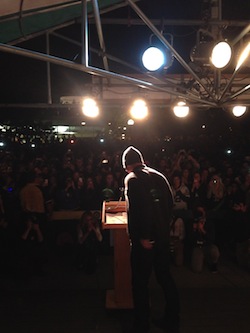
Editor's Note: The author of this post is Travis Waldron, a reporter with ThinkProgress.org. This blogpost originally appeared on ThinkProgress.
MADISON, Wisconsin — On homecoming week here at the University of Wisconsin, a local football star had campus celebrating. But the crowd of more than 2,000 students gathered at Memorial Union hall had nothing to do with Wisconsin’s looming Big Ten battle with Northwestern. Instead, the crowd came for Green Bay Packers quarterback Aaron Rodgers, who was here to talk about Congo.
Congo? Yes, Congo.
Rodgers came to Madison to promote the Conflict-Free Campus Initiative alongside the Enough Project and the Raise Hope For Congo Campaign, both of which are raising awareness about war in Congo and its connection to Americans. One of the campaign’s main targets is the minerals that are mined from the country and used to produce technology products like cell phones, computers, and televisions. Those minerals don’t just go into Americans’ favorite products. Their sale also finance a decades-long Congolese war in which rape and genocide are weapons and children are often soldiers.
Wisconsin is one of 150 college campuses that has signed on to the Conflict-Free Campus Initiative, which urges colleges and universities to avoid using products containing conflict minerals and to pressure businesses to invest in conflict-free minerals in Congo. Student leaders here are pushing the school’s administration to make it the 16th school to officially adopt a resolution making the campus conflict-free.
Now they have the help of one of America’s most famous football players, an NFL Most Valuable Player and Super Bowl-winning quarterback, who, having solidified his place in both Green Bay and the NFL, is looking for a way to make a difference in the world around him.
“I’ve been given a platform based on the success that we’ve had as a team and that I’ve had individually,” Rodgers told ThinkProgress after the event here Monday night. “What am I going to do? I have a voice, I have an opportunity to tell people what I care about. And I care about this deeply, I care about making an impact in this world.”
In an age where athletes are loath to speak out and risk alienating any of their fans, how did an NFL quarterback with a mega-million-dollar contract end up on this stage in Madison, using words like “movement” and “activism” and “change”? And how did that quarterback end up choosing Congo as his cause? For Rodgers, it all starts at the Super Bowl.
Rodgers was “on top of the world” on the first weekend of February 2011. The man who had gone from junior college nobody to top college quarterback, to NFL backup, to superstar quarterback had just led the Packers to victory in Super Bowl XLV.
And yet sitting on the bus after that win in Dallas, something felt empty.
Rodgers sat there wondering whether this was it, filled with a yearning to make sure it wasn’t. He started looking for ways to help — he was already doing work with cancer programs — but he never quite found it, a cause that would bring him to a place like this, in front of a crowd like this, to wake them up to an issue that was new to them.

